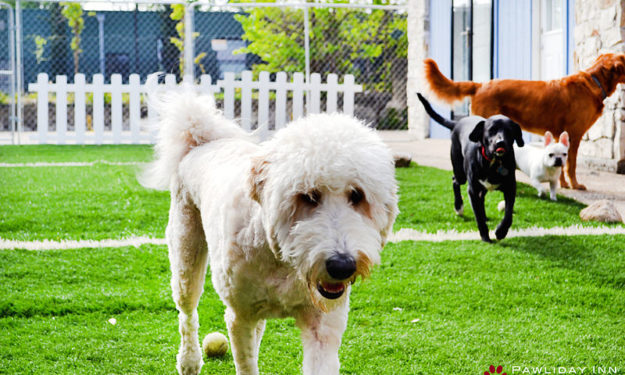5 Tips for Boarding Your Dog: What to Bring and How to Prepare

Summer is a popular time for travel, and sometimes those travel plans don’t include your dog. That’s okay! Some dogs don’t make the best travel buddies, and some places aren’t the most dog-friendly. Or maybe you just need a break (no judgements, we all do!). For these reasons, many dog owners choose to board their dog at a kennel while they’re away.
Once you’ve researched and found a kennel that fits your dog’s needs and your budget, here’s some quick tips to make sure your dog is ready and will have a good time:
#1: Paperwork 101
Don’t wait until the last minute! Your dog’s vaccines and labwork should be done (if they aren’t already up-to-date) no less than two weeks before boarding in order for them to be most effective. For boarding, this usually means a current:
- Rabies vaccine
- Distemper vaccine
- Kennel cough (Bordetella) vaccine
- Negative fecal test (they will often ask for the actual lab results, not just a certificate)
Some kennels may also require a negative heartworm test and/or canine influenza vaccine, so always be sure to call ahead and ask what their requirements are. Try to fax or email your dog’s paperwork ahead of time in case anything comes up. Be sure to bring it with you when dropping your dog off too, just in case!
Also try to fill out and send the kennel’s forms (registration, consent, contact info, instructions, etc.) ahead of time. This saves you time when you’re dropping off your dog and also makes the process easier if you arrive at a particularly busy or chaotic time. Again, bring copies with you to drop off just in case they get lost in translation.
If the paperwork is already done, you can focus on saying bye to your pup and making sure you don’t forget anything.
#2: Be Honest & Tell Them Everything
Every bit of information you can mention to the kennel staff will help them make your dog’s stay easy & safe for both your pup and the staff. Most kennel staff members are trained to deal with and notice things, if they are aware of them. Be sure to verbally, or in writing, tell them about any:
- Behavioral history (stranger danger, kennel/food aggression, fears, separation anxiety, problems with small dogs or men, etc.)
- Medical info (food allergies, medications/supplements, nervous GI upset, etc.)
- Quirks & habits (eating/sleeping/drinking/urinating/defecating habits, personality quirks, eating toys/bedding, etc.)
#3: Get Your Dog Used to the Place
Consider bringing your dog for daycare or a few visits before boarding them, especially if your dog is nervous or not used to being away. Daycare and quick pop-ins let your dog get used to the facility and staff and still be able to go home at the end of the day, making it a positive experience. By the time they board, they’ll be set up for success and excited to be there!
Some kennels do require your dog to be an established daycare resident or do a consult, evaluation, or trial. You may also want to tour the facility yourself too, to ensure it is perfect for your pup.
#4: Bring Things from Home (if allowed)
Some kennels allow you to bring beds, toys, bowls, and other things from home. Some do not allow such things because of the risk of losing or damaging them. But if you can bring things, you should. Familiar smells can help your dog feel more relaxed. Even an old piece of clothing, favorite blanket, or toy to chew on can make a difference. Don’t bring anything too valuable, though, as things do get lost in the chaos sometimes.
Do also bring your dog’s regular dog food. Switching their food or using the food they have at the kennel can cause an upset stomach or picky eating. Pack extra, too, in case of any unexpected travel delays!
#5: Don’t Make a Big Fuss at Drop Off
When you’re dropping off your dog, don’t make a big fuss. Acting nervous, upset, or coddling your dog can make them feel that something is wrong or different. Use a calm and happy voice, give them treats, and say a quick goodbye as if it’s just a normal thing!
Ask the kennel staff questions, call to check in while you’re away, and see if they have any pet cameras set up so you can watch your pup have fun. We know leaving your dog behind can be tough, but these tips can help make it a little easier. Whether you’re going away for a weekend getaway or taking a week to travel far, your dog’s vacation at a boarding facility can be just as fun and relaxing if you do a bit of planning and preparation!
Written by RACHAEL GILLIS